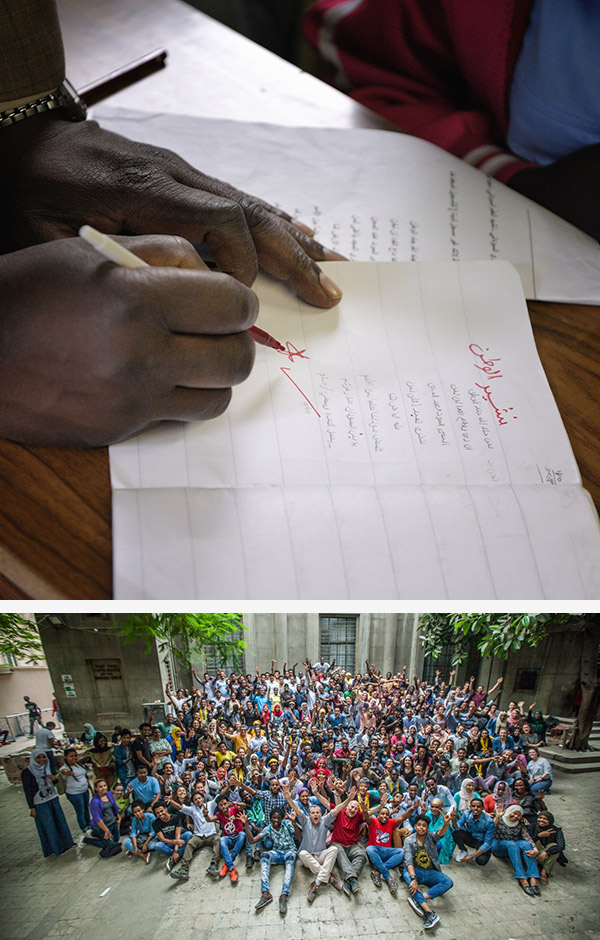Stories of Change

Top: a teacher at StARS corrects a student's paper. Photo by Paul Jeffrey. Bottom: the staff at StARS, 85 percent of whom are refugees themselves. Photo courtesy StARS.
At the end of 2017, the UNHCR had registered 219,413 individuals in Egypt, representing an approximate increase of 17 percent in comparison to 2016. Of the total, 57 percent are from Syria.
Helping refugee children in Cairo to stay in school
Imagine, for a moment, that you are a Syrian refugee family. You have fled from the atrocities of the Syrian Civil War to the relative safety of Cairo, in Egypt. Your children, like so many other refugee children, have had an extended period away from school and you want to get them back in the classroom and caught up. You know that an education can mean hope and a brighter future for your children, but there are too many expenses. You’re up against school fees, examination fees and even the costs of transportation to get your children to school and back each day.
You are particularly concerned about your daughters. Syrian refugee girls are often married off to older men for financial reasons. You want your daughters to be able to go to school instead, but again, the costs are daunting and there are very few places where you can go for assistance.
For too many families in Cairo, this isn’t a hypothetical. This is reality.
As the number of refugees in Cairo continues to grow – there was a 17 percent increase in Cairo’s population from 2016 to 2017, available services for refugees continues to shrink. In this environment of limited assistance, St. Andrew’s Refugee Services – known as StARS – is continuing to serve refugees with education and medical support, thanks to funding provided by CWS.
The team at StARS is well connected to the refugee community in Cairo, especially considering the vast majority of the staff (about 85 percent) are refugees themselves. They can help families like the ones in the scenario above.
StARS provides grants to children, young adults and adults who would otherwise be unable to afford school, college or university. When there is no other support, StARS is there for families.
Recent education grants have been provided to Syrian children whose fathers were either killed in or facing severe medical conditions and are unable to work as a result of the conflict in Syria. Some of these children’s mothers were able to provide small incomes for their families, but it was barely enough to survive on, let alone pay for school.
Other recipients are children of South Sudanese single mothers, whose refugee statuses are in limbo as UNHCR suffers from a lack of available staff to help. The families are currently living in Cairo without support, but they cannot return home because of ongoing conflict.
At one point, the StARS Community Outreach Team became aware of a Syrian student in first grade who was about to drop out of school. His parents have six children, and they couldn’t afford to keep him in school and weren’t able to raise money from their community for school fees. StARS provided an education grant to the family to keep him in school and ensure that he continued his education.
An 18-year-old Ethiopian refugee is caring for her two younger brothers, who are 12 and 15. The three siblings live in Egypt without any family. They receive financial assistance that covers one brother’s school fees and part of the other’s. It wasn’t enough, though, to guarantee that the second brother could stay in school, so StARS stepped in to help. She received an education grant to cover the rest of the fees, and now both brothers are in school. This guarantees that the brothers are able to get an education, but it also means that their sister has the time and opportunity to work to support the family.
Every child deserves an education, no matter where he or she is from or what he or she has been through. For many refugees in Cairo, when options are limited and hope is waning, we are there to help.
